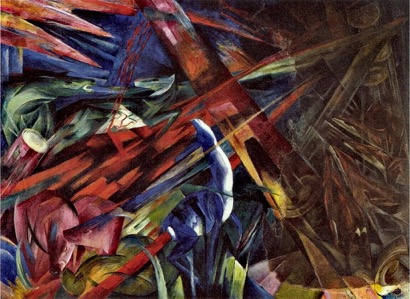HumanNature

Franz Marc: Tierschicksale [Fate of the Animals] (1913)
"When it's already too late to learn better, we might finally start personally relating our own innate HumanNature …"
When The Plague hit Florence in the 1340s, people reacted similarly to how we've reacted to This Damned Pandemic today. I've long questioned just what it might mean to know something, for knowledge does not tightly correlate with behavior. Knowing something doesn't necessarily change anything I do. I suspect that this reaction stems from what I might characterize as an abiding Personal Sense Of Exemption, that even what I know for certain seems more likely to apply to others, but not directly to me. Speed limits seem to reinforce this proposition, since even when it seems clearly in everyone's benefit to obey them, a herd-like mentality seems to override caution, and almost everyone exceeds the limit, perhaps sensing that everyone else is getting away with something and that they don't want to feel cheated, especially that they might be cheating themselves. Personal imperiling to avoid feeling cheated might be HumanNature incarnate. We might just as well have dinner in that restaurant. Everyone else seems to be going and we wouldn't want to feel left out. ©2020 by David A. Schmaltz - all rights reserved
Describing HumanNature seems eerily similar to relying upon a fish to explain water, a fish so intrinsically immersed within the stuff that it might prove utterly invisible to any fishy observer. Yet I sense that I can sometimes at least intuit its presence, our response to This Damned Pandemic definitely notwithstanding. We seem a natively skeptical lot, and always have been. How else to explain Lot's wife looking back when The Lord God expressly forbade her to do that? We're not easily convinced that anything necessarily applies directly to us, to our experience, to our personal choices. Unlucky others suffer from their own errors, and human volition seems only a distant potential contribution to my personal fate. Humans behave as if we each carried an irrevocable Get Our Of Jail Free card until it's too late to extricate ourselves from what each will later explain away as simple fate. Who could have possibly predicted such an outcome? Well, besides every possible observer but one, probably no one. We often do ourselves in, though some inevitable demise seems to have been built into everyone. Few humans seem to behave as if they believe this tenet.
We seem terribly attracted to fantastical explanations. When The Plague hit Florence, conspiracy theories bloomed with equal or even greater volume than fresh infections. Jews were widely seen as the cause, the same way that some today seem dedicated to blaming the Chinese or nefarious liberal politicians. Some continued living just as they had before, hosting dinner parties where each evening, fewer and fewer had survived to attend. People walked around with smoldering herbs, believing these would ward off evil humours. Then, nobody had any idea how The Plague spread, but everybody held an explanation which mostly omitted themselves as either target or cause. People died in droves. Many became more superstitiously religious, as if sudden righteousness might protect them, and these beliefs worked right up to the point when they didn't. The dead were buried in graves with bodies stacked up like lasagna, according to one witness at the time. Gravediggers profited most.
Preaching personal responsibility seems perfectly congruent with who we really should know ourselves to be. Had somebody been watching all these centuries, we might well understand the limits taking personal responsibility imposes, which has always been not much. We might just as well exhort someone to take personal responsibility for the quality of the air they breathe or the water they drink, for these seem more influenced by a social responsibility not within the capacity of any individual human being. Pandemics, like plagues, seem to demand some broader coordination, since nobody really understands what's happening at the beginning and 'every man for himself' seems most likely to squelch ever gaining broader knowledge, though gaining knowledge might not influence any behaviors for many generations following, if ever. Some fled their cities when the plague arrived, inadvertently social distancing without any understanding of the benefits it might bring. In retrospect, these refugees seem prescient, but in the moment, they were most likely just scared. Nothing awakens human action like a realization that something's actually out to get them. Many down-played every call to action.
However smart we might become, we're unlikely to outrun HumanNature. Sometimes I could swear that my nurse practitioner's just out to convince me that I'm subject to HumanNature. She's a pain in the butt when she cautions me that the general rules of epidemiology even apply to me, though her assertions seem unlikely. I do not, for instance, yet exhibit symptoms of chronic heart disease, but without taking these annoying pills, I might well experience an irreversible case by the time I'm ninety, should I somehow manage to live that long. In the short run, HumanNature protects me. In the longer run, HumanNature seems likely to simply do me in, though this proposition has yet to be proven in my specific situation. I wear my mask more to protect others than to protect myself. I welcome the many mandates because they seem a slightly better option than simply relying upon either faith or fate. When it's already too late to learn better, we might finally start personally relating our own innate HumanNature, a decidedly back-handed form of personal responsibility.


